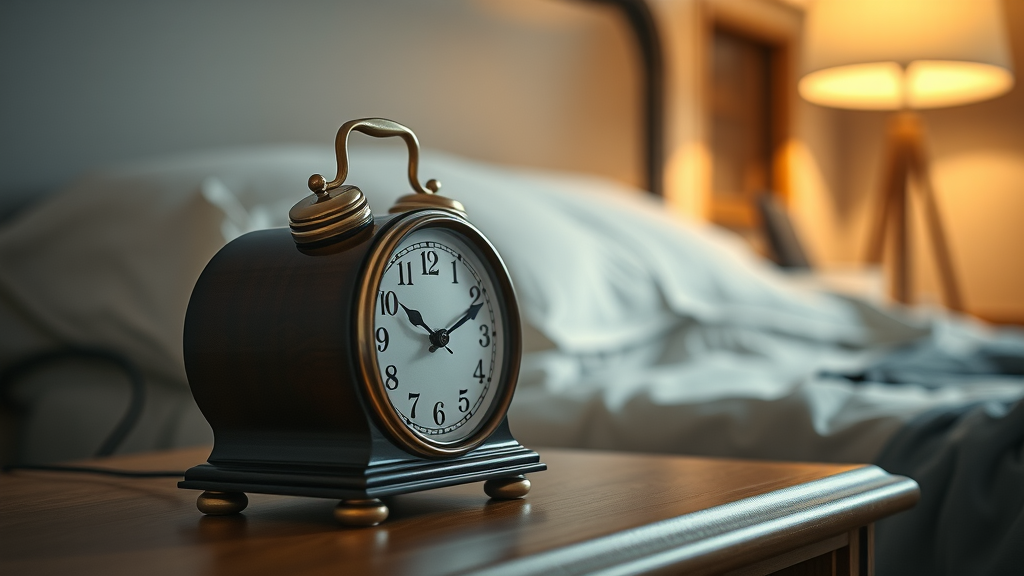Are you tired of tossing and turning at night, only to feel drained during the day? You're not alone! Our modern lifestyles often disrupt our natural sleep-wake cycles, leaving us fatigued and unfocused. But what if mastering your circadian rhythm could be the key to unlocking better sleep and boundless energy? In "Master Your Circadian Rhythm for Better Sleep and Energy," we’ll dive into the science behind this vital biological clock and share practical tips to help you reclaim your nights and energize your days. Say goodbye to sleepless nights and hello to vibrant living!
Understanding Circadian Rhythm
What is a Normal Circadian Rhythm?
A normal circadian rhythm is a natural, internal process that regulates the sleep-wake cycle and other physiological processes in a roughly 24-hour cycle. It is influenced by external cues like light and temperature. Typically, a healthy circadian rhythm promotes alertness during the day and sleepiness at night, aligning with the natural cycle of day and night.
In humans, the circadian rhythm is primarily controlled by the suprachiasmatic nucleus (SCN) in the brain, which responds to light signals. This internal clock helps determine when to release hormones like melatonin, which signals the body to prepare for sleep.
The Science Behind Circadian Rhythm
The science of circadian rhythms involves complex biological processes that are crucial for maintaining overall health. These rhythms are governed by clock genes that regulate various bodily functions, including sleep, metabolism, and hormone release. Disruptions to these rhythms can lead to various health issues, including sleep disorders, mood disturbances, and metabolic problems.
Research has shown that maintaining a consistent circadian rhythm can improve sleep quality and overall well-being. For instance, studies indicate that individuals who adhere to regular sleep schedules experience better sleep quality and enhanced cognitive function.
Signs Your Circadian Rhythm is Off
How Do I Know if My Circadian Rhythm is Off?
Identifying disruptions in your circadian rhythm can be challenging, but there are several signs to look out for. If you find yourself feeling excessively sleepy during the day, struggling to fall asleep at night, or waking up frequently throughout the night, these may be indicators of a misaligned circadian rhythm.
Other signs include difficulty waking up in the morning, feeling groggy upon waking, and experiencing mood swings or irritability. If you notice these symptoms, it may be time to assess your sleep habits and environmental factors that could be affecting your circadian rhythm.
Common Symptoms of Disrupted Circadian Rhythm
- Excessive daytime sleepiness
- Difficulty falling asleep or staying asleep
- Frequent headaches
- Increased stress levels
- Changes in appetite or weight
How to Fix Your Circadian Rhythm
How Do I Fix My Circadian Rhythm?
Fixing your circadian rhythm involves making lifestyle adjustments that promote a healthy sleep-wake cycle. Start by establishing a consistent sleep schedule, going to bed and waking up at the same time every day, even on weekends. This consistency helps reinforce your body's internal clock.
Additionally, consider reducing exposure to blue light from screens in the evening, as this can interfere with melatonin production. Instead, opt for dim lighting and relaxing activities before bedtime to signal to your body that it's time to wind down.
6 Easy Steps to Rebalance Your Circadian Rhythm
- Establish a consistent sleep schedule.
- Limit exposure to blue light in the evening.
- Create a relaxing bedtime routine.
- Incorporate natural light exposure during the day.
- Avoid caffeine and heavy meals close to bedtime.
- Consider using light therapy if you struggle with seasonal changes.
Factors Affecting Your Circadian Rhythm
Light and Dark: The Role of Environment
The environment plays a crucial role in regulating your circadian rhythm. Natural light exposure during the day helps signal to your body when to be awake and alert, while darkness at night promotes sleep. Artificial lighting, especially blue light emitted from screens, can disrupt this natural cycle, leading to difficulties in falling asleep and waking up.
To support a healthy circadian rhythm, aim to spend time outdoors during daylight hours and minimize exposure to bright screens in the evening. Consider using blackout curtains to create a dark sleeping environment.
Lifestyle Choices Impacting Circadian Rhythm
Your daily habits significantly impact your circadian rhythm. Factors such as diet, exercise, and stress levels can either support or disrupt your internal clock. For instance, regular physical activity can help regulate sleep patterns, while high-stress levels can lead to insomnia and other sleep disorders.
Additionally, consuming a balanced diet and avoiding stimulants like caffeine and nicotine close to bedtime can help maintain a healthy circadian rhythm.
The Benefits of a Healthy Circadian Rhythm
Improved Sleep Quality
One of the most significant benefits of maintaining a healthy circadian rhythm is improved sleep quality. When your internal clock is aligned with your sleep-wake cycle, you are more likely to experience deeper, more restorative sleep. This can lead to increased energy levels and better overall health.
Enhanced Energy Levels
Aligning your circadian rhythm with your natural sleep patterns can also enhance your energy levels throughout the day. When you get quality sleep at night, you wake up feeling refreshed and ready to tackle the day ahead. This can improve productivity, focus, and mood.
Practical Tips for Mastering Your Circadian Rhythm
Establishing a Consistent Sleep Schedule
As mentioned earlier, establishing a consistent sleep schedule is vital for mastering your circadian rhythm. Aim to go to bed and wake up at the same time every day, even on weekends. This consistency reinforces your body's internal clock and helps regulate your sleep patterns.
Creating a Sleep-Inducing Environment
Your sleep environment can significantly impact your circadian rhythm. Ensure your bedroom is dark, quiet, and cool to promote better sleep. Consider using blackout curtains, earplugs, or white noise machines to create an ideal sleeping environment.
Incorporating Natural Light Exposure
Natural light exposure is essential for regulating your circadian rhythm. Try to spend time outdoors during the day, especially in the morning. This exposure helps signal to your body that it's time to be awake and alert, promoting a healthy sleep-wake cycle.
People Also Ask
What is meant by circadian rhythm?
The term circadian rhythm refers to the natural, internal processes that regulate the sleep-wake cycle and other physiological functions in a roughly 24-hour cycle, influenced by external cues like light and temperature.
Key Takeaways
- Understanding your circadian rhythm is crucial for improving sleep and energy levels.
- Signs of a disrupted circadian rhythm include excessive daytime sleepiness and difficulty sleeping at night.
- Implementing lifestyle changes can help rebalance your circadian rhythm.
- Maintaining a healthy circadian rhythm leads to improved sleep quality and enhanced energy levels.
Conclusion
Mastering your circadian rhythm is essential for achieving better sleep and increased energy. By understanding the science behind this biological clock and implementing practical tips, you can reclaim your nights and energize your days. Remember, a well-aligned circadian rhythm not only enhances your sleep quality but also contributes to your overall health and well-being.
What You'll Learn
In this article, you will learn about the importance of circadian rhythms, how to identify disruptions, and practical steps to improve your sleep and energy levels.
Tables
| Factor | Impact on Circadian Rhythm |
|---|---|
| Light Exposure | Regulates sleep-wake cycles |
| Sleep Schedule | Reinforces internal clock |
| Diet | Affects sleep quality |
| Exercise | Promotes better sleep |
Quotes
"A well-regulated circadian rhythm is essential for optimal health and well-being." - Dr. Lulu Guo
Lists
- Signs of a disrupted circadian rhythm:
- Excessive daytime sleepiness
- Difficulty falling asleep
- Frequent headaches
FAQs
- What is a normal circadian rhythm? A normal circadian rhythm aligns with the natural cycle of day and night, promoting alertness during the day and sleepiness at night.
- How do I fix my circadian rhythm? Fixing your circadian rhythm involves establishing a consistent sleep schedule, reducing blue light exposure, and creating a sleep-inducing environment.
- How do I know if my circadian rhythm is off? Signs include excessive daytime sleepiness, difficulty falling asleep, and mood swings.
- What is meant by circadian rhythm? It refers to the internal processes that regulate sleep-wake cycles and other physiological functions in a 24-hour cycle.
Video Section 1
Watch this video to learn more about the importance of circadian rhythms and how to master them for better sleep.
Video Section 2
Check out this video for practical tips on improving your circadian rhythm and enhancing your energy levels.






For additional insights on enhancing your sleep quality, check out our article on Unlock Your Best Sleep: Biohacking Techniques for Energy Boost. This resource provides valuable biohacking techniques that can complement your efforts in mastering your circadian rhythm.
 Add Row
Add Row  Add Element
Add Element 



 Add Row
Add Row  Add
Add 
Write A Comment